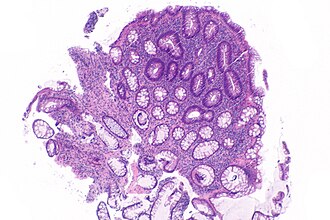Difference between revisions of "MUTYH polyposis syndrome"
Jump to navigation
Jump to search
| (2 intermediate revisions by the same user not shown) | |||
| Line 1: | Line 1: | ||
[[Image:Tubular adenoma in MUTYH polyposis -- low mag.jpg|thumb| | [[Image:Tubular adenoma in MUTYH polyposis -- low mag.jpg|thumb|[[Colorectal tubular adenoma]] in MUTYH polyposis. [[H&E stain]].]] | ||
'''MUTYH polyposis syndrome''', also '''MYH polyposis syndrome''', is an autosomal recessive syndrome characterized by numerous polyps and an increased risk of [[colorectal carcinoma]].<ref name=omim604933>{{OMIM|604933}}</ref> | '''MUTYH polyposis syndrome''', also '''MYH polyposis syndrome''', is an autosomal recessive syndrome characterized by numerous polyps and an increased risk of [[colorectal carcinoma]].<ref name=omim604933>{{OMIM|604933}}</ref> | ||
| Line 14: | Line 14: | ||
*[[Familial adenomatous polyposis]]. | *[[Familial adenomatous polyposis]]. | ||
*[[Serrated polyposis syndrome]]. | *[[Serrated polyposis syndrome]]. | ||
Note: | |||
*The histomorphology of the polyps in the syndrome are not distinctive from sporadic ones. | |||
==See also== | ==See also== | ||
Latest revision as of 01:57, 25 March 2019
MUTYH polyposis syndrome, also MYH polyposis syndrome, is an autosomal recessive syndrome characterized by numerous polyps and an increased risk of colorectal carcinoma.[1]
The MUTYH gene is a mismatch repair gene. Mutations lead to defective base excision repair - specifically, more transversions.[1]
Microscopic
Features:
- Commonly manifest as a mix of:[2]
DDx:
Note:
- The histomorphology of the polyps in the syndrome are not distinctive from sporadic ones.
See also
- Colorectal carcinoma.
- Familial adenomatous polyposis.
- Hyperplastic polyposis syndrome.
- Intestinal polyposis.
References
- ↑ 1.0 1.1 1.2 Online 'Mendelian Inheritance in Man' (OMIM) 604933
- ↑ Boparai, KS.; Dekker, E.; Van Eeden, S.; Polak, MM.; Bartelsman, JF.; Mathus-Vliegen, EM.; Keller, JJ.; van Noesel, CJ. (Dec 2008). "Hyperplastic polyps and sessile serrated adenomas as a phenotypic expression of MYH-associated polyposis.". Gastroenterology 135 (6): 2014-8. doi:10.1053/j.gastro.2008.09.020. PMID 19013464.
